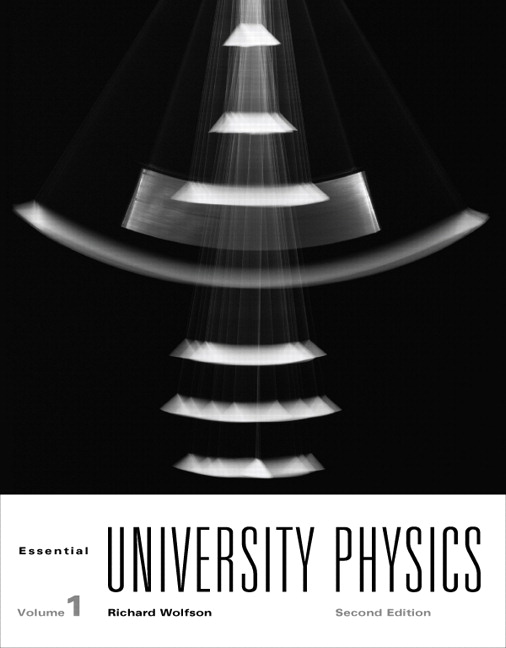PHYSICS 226N/231N University Physics
I
SPRING 2012
Phys 226 CRN Lecture/Lab 22760/22761 and Phys 231 CRN Lecture/Lab
20173/20200
Course Instructor 
Professor:
Dr. Charles E.
Hyde
Office: Room 2100C Physical Sciences
Building (PSB), attached to OCNPS
Phone: 683-5853 (email is better than
phone)
Email: chyde
‘at’ odu.edu
Office
Hours: *Wed 3:00 -- 3:59
pm and Thurs 4:00
– 4:59
pm in
the Physics Learning Center (OCNPS 2nd floor lobby),
or
by appointment
Course Materials
- Text: Essential Understanding Physics
, 2nd Edition by R. Wolfson ISBN
9780321714381

- Note that the ODU bookstore price of $149 includes volume 2
you will need for Phys 227/232 and a two semester bundle of
WebAssign, required for your homework.
- Access packet for “WebAssign” online resources (comes
with
2 semester bundle with text at ODU Bookstore).
- You do not need to
purchase a Laboratory Manual. Lab exercises will be handed
out in
class.
- 'Clickers'
You must
purchase a
TurningTechnologies ResponseCard 'clicker' for in-class
questions.
- Two
Bound
notebooks ( one each for Homework and Labwork-preferably
square ruled for graphing)
- Optional Material: Spark
Charts or Bar Charts
for Physics
Course Schedule
Lectures: Room 142
Physics/Oceanography
Building (OCNPS).
CRN 22760 and 20173 MW 12:00pm -
1:50 pm
Labs:
Room 142 Physics/Oceanography Building (OCNPS).
CRN 22761 and 20200 F 1:00pm - 1:50
pm
Final Exam: Room 142 OCNPS
CRN 22760 and 20173 Friday 27 April 2012
12:30 - 3:30 pm
Course Information
Course Content
In this calculus-based course you will be introduced to some core
topics in physics - in particular the study of motion, or mechanics
of
particles and extended bodies, including the the propagation
of
waves in substances.
Course Description
Through in-class activities, lectures (very brief), laboratories,
reading and homework assignments you will learn how to use critical
thinking combined with mathematics to describe simple physical
processes and develop basic problem solving skills. In addition to
covering both theory and experiment, we will also use numerical
computation to model and visualize simple physical systems in order
to
gain insight into the underlying physics. There will be both
individual
and group activities. Group activities will stress teamwork and
communication skills. Unlike the traditional lecture format, in this
class we will rely on interactive instruction and cooperative
learning.
Course Web Page
General course information, including HW solutions, Lab assignments,
Grades, will be on Blackboard
Corequisite
Math 211 (Calculus 1) or equivalent is a corequisite for this
course.
No prior physics knowledge or experience in computer programming is
assumed.
Reading Assignments
You will be given a reading assignment from the text for each
class. It is essential you complete the readings BEFORE
class. The in class exercises and quizes will be based on the
text. You will be given a mini-homework assignment online to
complete BEFORE class,
based on the reading.
Homework
Physics is best learned by attempting to solve problems. In this way
you will become familiar with the concepts and comfortable with the
mathematical methods required. A good portion of in-class time will
be
spent working on problems. In addition, you will be given two
Homework
Assignments each week. The first will be very short,
with emphasis on conceptual questions. This must be completed
before class. The second will be longer, and you will
generally have two weeks to complete it. You will submit your
homework solutions online
using MasteringPhysics. Assignment solutions will be
posted on the
Blackboard Physics 231N website. Use of published homework solutions
is
cheating.
MasteringPhysics
The student access kit contains a code which will allow you to
register
on WebAssign (www.webassign.net). When entering your UIN (here or
anywhere), be sure to include any leading zeros as the UIN may be
read
as a text string instead of a number. The course ID on
MasteringPhysics depends upon your section.
- Section: Phys226N, CRN 22760 MasteringPhysics ID MPHYDE226SPRING2012
- Section: Phys231N, CRN 20173 MasteringPhysics ID MPHYDE231SPRING2012
Homework Journal
You must also keep a "homework journal" which shows how you solved
the problems from the homework assignments. Written work must show
a statement of the problem, labeled diagrams, defined variables, the
appropriate physics
equation(s), the mathematical solution and units. This will be
checked
and graded periodically.
Group Work
You will be assigned to a group of three students. Many class
activities will require you to work together with your
group. Further details of the group activities will be
given in class. Groups will be rearranged periodically.
Laboratory
Laboratory exercises will be integrated with in-class lectures and
activities. You do not need to purchase a lab manual. Lab handouts
will
be distributed in class. Labs will vary in length and complexity and
will be done in groups. Some labs may require formal lab reports.
These
should
follow basic scientific report guidelines. The report
should be concise, but should contain a basic description of the
equipment, proceedures, and raw results. The report should
also
contain a narrative explanation of any questions/calculations that
were
requested in the lab assignment. Some of the labs will also
require formal graphs, either
drawn on graph paper, or computer generated, e.g. by Excel (use the
scatter plot option).
Each group will submit a single lab write-up. To receive credit for
the
lab report, you must have contributed to the lab report. If a member
of
the group
does not contribute to the report, that person's name must not
appear
on the lab report.
Quizzes
Quizzes will be given every Friday, except on exam weeks. A quiz
consists of a few short problem-solving and descriptive questions
designed to take you 20 minutes or less, if you are prepared.
Generally, these will be taken with no books or notes, though an
equation sheet may be used. There are no make-ups; however, the
lowest
quiz score will be dropped.
Examinations
This course will contain three in-class examinations and a
comprehensive final exam. If you must miss an exam, contact Dr. Hyde
as
soon as possible. Make-up exams will not be given but if you have a
legitimate reason for missing an exam, your final exam score will be
prorated, on a case-by-case basis. Exams are closed book, but
you
will be allowed a single page (double-sided) formula sheet.
All
exams will be in ONCPS Rm 142. The lowest (in class) exam
score will be dropped
Exam Schedule
- Exam 1, Wednesday February 1: Chapters 1-3.
- Exam 2, Wednesday February 29: Chapters 1-6.
- Exam 3, Monday April 2: Chapters 1-10.
- Final Exam (see above) Friday April 27, 12:30-3:30 pm.
Final Course Grade
This course is not curved. All students can get an A.
A letter grade will be assigned at the end of the course on the
basis
of numerical scores obtained from the three in-class exams, the
final
exam, laboratory work,
homework assignments, lab reports, quizzes, class participation, and
end of term trend. The weighting will be approximately as follows.
In-class Exams
|
30%
|
Final Exam
|
30%
|
Online Homework
|
15%
|
Homework Journal
|
5%
|
Class Participation*
|
5%
|
Lab Reports
|
10%
|
Quizes
|
5%
|
*Class participation includes attendance, clicker questions, class
activities, etc.
Letter grades will be assigned approximately as follows (total point
score out of 1000)
A- to A 900
— 1000
B- to B+ 800 — 899
C- to C+ 650 — 799
D- to D+ 500 — 649
F
000 — 499
Attendance
Attendance is mandatory. If you have to legitimately miss a class,
it
is your responsibility to find out what you missed. Additionally, if
you know you are going to be absent, please inform your team members
so
they are prepared to be short-handed that day.
The Physics Learning Center
Help with any aspect of physics is available in the Physics Learning
Center (2nd floor, PSB), Monday-Friday 9am - 5pm.
The Physics Learning Center is a place where students can get
together
to work on their homework and get assistance, if needed, from
physics
faculty and grad students. No appointment is necessary. Students in
all
introductory classes are encouraged to drop by the Learning Center
for
help on homework, lab, lecture, other course material, or just for a
place to work while in the physics building. Note: staffing of the
Physics Learning Center starts the second week of classes. More
info,
including a detailed staffing schedule, can be found at the
following
link:
Course Schedule
University Honor Code
You are expected to conform to the University Honor Code in all
aspects
of your conduct in this course. You may work with others on the
homework assignments and laboratory work, however, what you submit
must
represent your own understanding of the problem. Submitting answers
online for problems that you have not worked out is cheating.
Misconduct of any form will not be tolerated.


